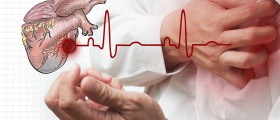
Congestive Heart Failure - Introduction
A congestive heart failure is a medical condition which features with heart's inability to pump blood properly and provide with adequate supply of oxygen of many organs and organ systems in the body.
Congestive heart failure can be classified into systolic and diastolic. In systolic heart failure the pumping ability of the heart is reduced and a common clinical measurement called the ejection fraction (EF) is reduced and accounts for less than 50%. Normal value for EF is greater than 50%. In diastolic heart failure the heart can contract normally but it is stiff when it comes to relaxing and filling with blood. This significantly affects blood filling into the heart and the blood regurgitates into the lungs.
Causes of Congestive Heart Failure
Congestive heart failure basically occurs in case the patient is suffering from diseases which weaken the heart muscle, diseases which cause stiffening of the heart muscle and conditions which demand increased supply with oxygen where the heart simply cannot fulfill this request.
Many illnesses of the heart may interfere in normal pumping of the blood and lead to congestive heart failure. Weakness of the heart muscles can be a consequence of previous heart attack or result from myocarditis. In people suffering from hemochromatosis and amyloidosis certain substances accumulate in the heart and this leads to stiffening of the heart muscles which consequently results in impaired ventricles' capacity to relax and fill. Furthermore, certain conditions such as anemia or hyperthyroidism require increased amounts of oxygen and the heart is simply not capable of satisfying the demand. In some patients there is even a combination of factors which contribute to the onset of congestive heart failure.
No matter what the cause is congestive heart failure has many negative effects on numerous organs in the body. Inappropriate supply of the kidneys, for example, causes loss of their ability to excrete salt and water. This consequently leads to fluid retention. Congestive heart failure also affects the lungs and leads to pulmonary edema. There is also a chance of fluid accumulation in the liver which prevents this organ from performing proper elimination of toxins and normal production of essential proteins. The effect of congestive heart failure on intestine reflects in inefficient absorption of nutrients and medications.
Symptoms of Congestive Heart Failure
There is a variety of symptoms of this medical condition and they are not the same in all patients. The symptoms basically depend on whether the congestive heart failure has already affected distant organs or the patient only suffers from heart conditions responsible for congestive heart failure.
Initially the patients complain about fatigue but this symptom is also characteristic for many other illnesses. Patients also notice that their ability to exercise is diminished. Once the body is overloaded with fluid the patients usually complain about swelling of the ankles and lower legs. Accumulation of fluid in the lungs causes breathing difficulties. Patients may also have problems with sleeping and be able to sleep only while sitting upright. And finally, accumulation of the fluid in the liver and intestines may cause nausea, abdominal pain and loss of appetite.

















Your thoughts on this
Loading...